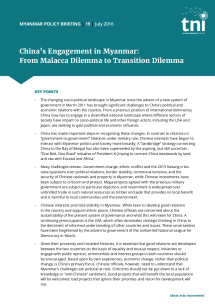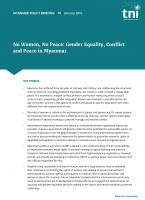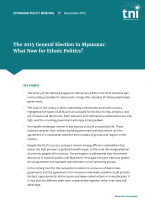China’s Engagement in Myanmar: From Malacca Dilemma to Transition Dilemma
Topics
Regions
Myanmar’s political transition, which began in 2011, has brought China’s relationship with the country into question. China has made important steps to recognise this, but fundamental difficulties remain, including ongoing ethnic conflict and conflicting visions of development. Given their proximity and troubled histories, it is essential that good relations are developed between the two countries on the basis of equality and mutual respect. This briefing outlines the key histories, developments and strategies in recent Myanmar-China relations.

Downloads
-
China's Engagement in Myanmar: From Malacca Dilemma to Transition Dilemma (PDF, 515.02 KB)Average time to read: 80 minutes minutes
Keypoints
-
The changing socio-political landscape in Myanmar since the advent of a new system of government in March 2011 has brought significant challenges to China’s political and economic relations with the country. From a previous position of international dominance, China now has to engage in a diversified national landscape where different sectors of society have impact on socio-political life and other foreign actors, including the USA and Japan, are seeking to gain political and economic influence.
-
China has made important steps in recognising these changes. In contrast to reliance on “government-to-government” relations under military rule, Chinese interests have begun to interact with Myanmar politics and society more broadly. A “landbridge” strategy connecting China to the Bay of Bengal has also been superseded by the aspiring, but still uncertain, “One Belt, One Road” initiative of President Xi Jinping to connect China westwards by land and sea with Eurasia and Africa.
-
Many challenges remain. Government change, ethnic conflict and the 2015 Kokang crisis raise questions over political relations, border stability, communal tensions, and the security of Chinese nationals and property in Myanmar, while Chinese investments have been subject to criticism and protest. Mega-projects agreed with the previous military government are subject to particular objection, and resentment is widespread over unbridled trade in such natural resources as timber and jade that provides no local benefit and is harmful to local communities and the environment.
-
Chinese interests prioritize stability in Myanmar. While keen to develop good relations in the country and support ethnic peace, Chinese officials are concerned about the sustainability of the present system of governance and what this will mean for China. A continuing preoccupation is the USA, which often dominates strategic thinking in China to the detriment of informed understanding of other countries and issues. These uncertainties have been heightened by the advent to government of the civilian-led National League for Democracy in March.
-
Given their proximity and troubled histories, it is essential that good relations are developed between the two countries on the basis of equality and mutual respect. Initiatives to engage with public opinion, communities and interest groups in both countries should be encouraged. Based upon its own experiences, economic change, rather than political change, is China’s primary focus. Chinese officials, however, need to understand that Myanmar’s challenges are political at root. Criticisms should not be put down to a lack of knowledge or “anti-Chinese” sentiment. Good projects that will benefit the local population will be welcomed: bad projects that ignore their priorities and vision for development will not.
Introduction
As neighbours on a strategic crossroads in Asia, the relationship between China and Myanmar is today one of the most important in international geo-politics and regional development. After Myanmar’s independence, tensions with China were often deep as conflict and political turmoil swept both countries. In recent decades, ties have become closer due to social and political changes on both sides of the Yunnan frontier. Under previous military governments in Myanmar, this witnessed China becoming the largest foreign investor and dominant international influence in the country.
Since political transition began in 2011, many aspects of China’s engagement in Myanmar have come under challenge. Fundamental difficulties remain that can destabilise Myanmar-China relations at any time. These include ethnic conflict, Chinese investments, communal tensions, political reform and international power struggles. With the advent of a National League for Democracy (NLD) government this year, a new “Great Game” is underway that could have consequences for both the country and region for many decades to come.
This briefing examines the changing political and economic landscape, outlining the key histories, developments and strategies in recent Myanmar-China relations. A particular concern is the continuing conflict in the ethnic borderlands in Myanmar, which are in the front-line of contention and where many of the country’s most valuable natural resources are located. History has long warned that instability and political failure will continue until there is inclusive peace and reform in these territories.
In its race for economic growth and international influence, the Beijing government has major ambitions for Myanmar and the trans-Asian region in the 21 st century. In the South China Sea, this has become a source of tension. On the Yunnan border, in contrast, Chinese interests have made some important policy adjustments to socio-political change in Myanmar during the past five years. The Beijing government has also unveiled an ambitious “One Belt, One Road” vision linking China to Eurasia and beyond. But there is still a long way to go before equitable and stable relations are established to the benefit of the peoples of both Myanmar and China. Progress will depend on political solutions and economic relations that are in the interest of the peoples of Myanmar, developed by proper consultation and democratic acceptance, and not by initiatives or interventions that reflect economic self-advantage and superpower dominance.


